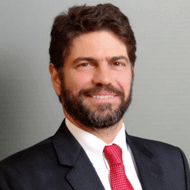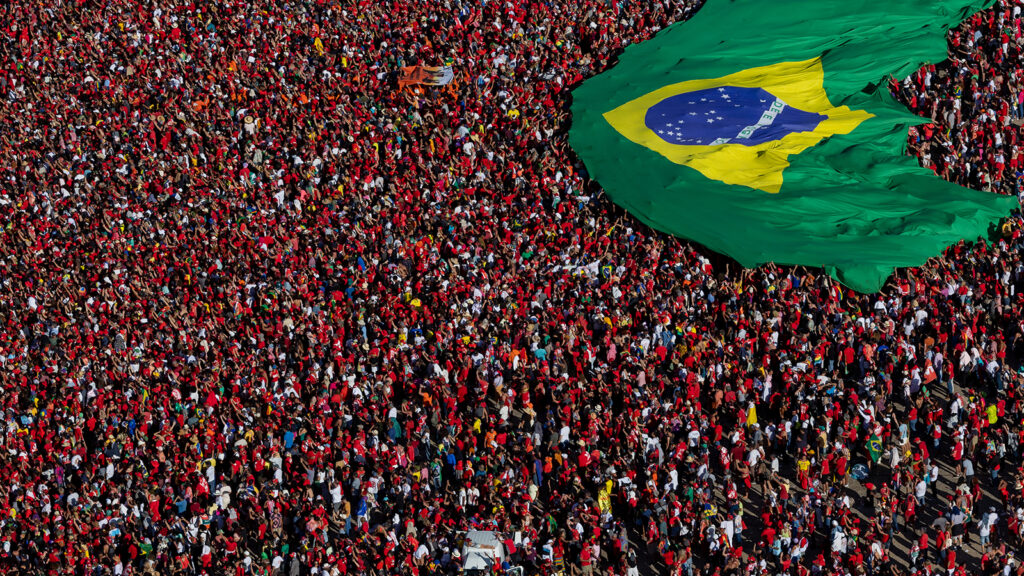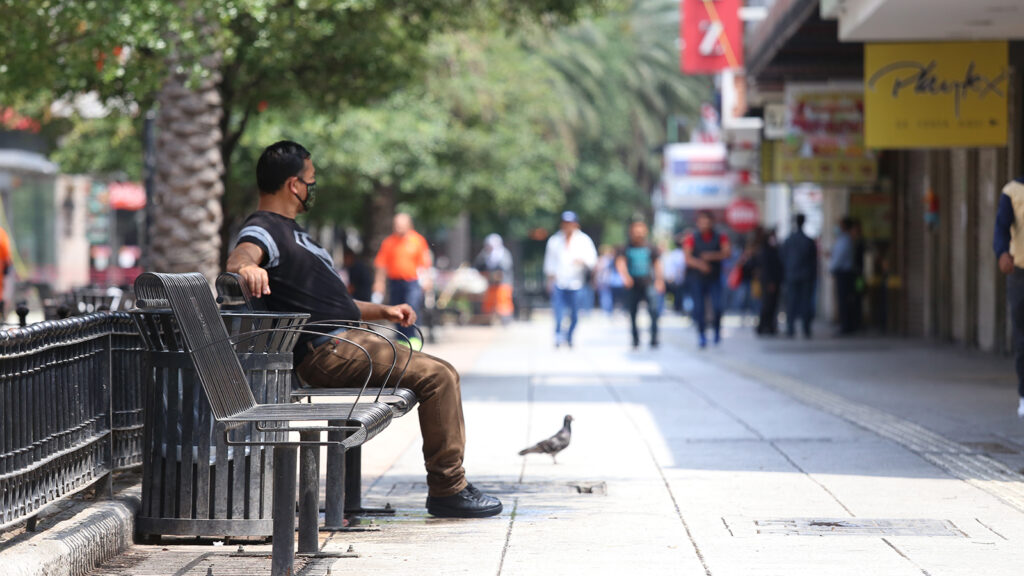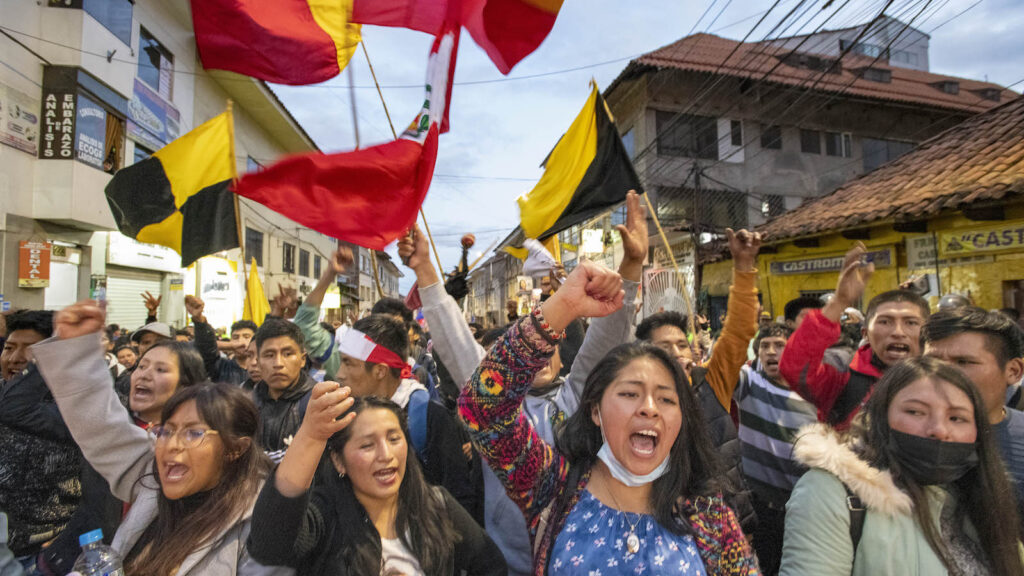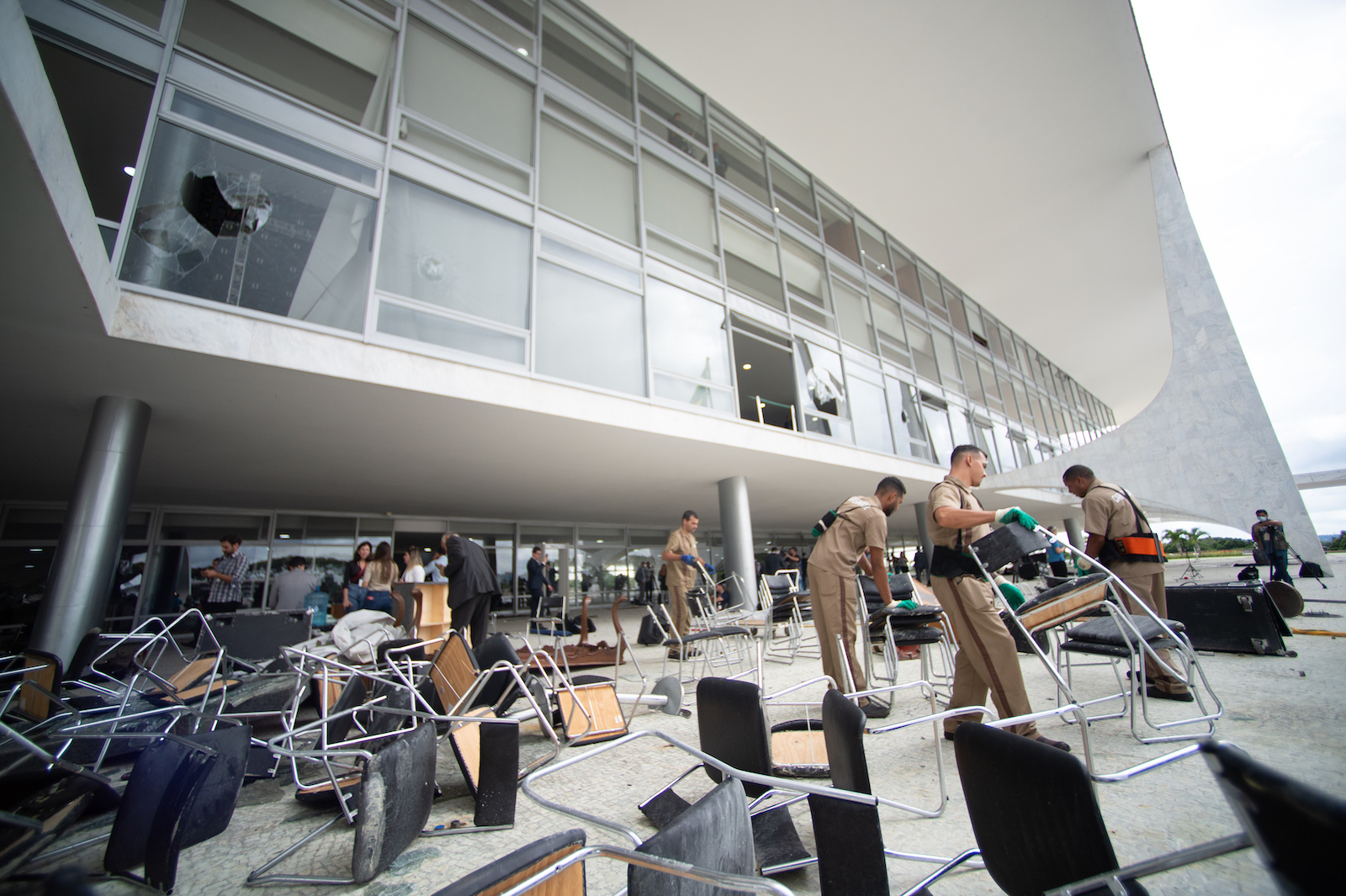
Traces of the destruction caused by radical supporters of former President Jair Bolsonaro at Planalto Palace on January 9, 2023 in Brasilia, Brazil. Brazil's President Lula called for peace after what he described as a coup attempt with over 1,200 supporters of Bolsonaro taking the national congress.
Photo by Andressa Anholete/Getty Images
On January 8, an extremist mob took over Brazil’s presidential palace, Congress and Supreme Court buildings following President Inácio Lula da Silva’s inauguration. Altamar podcast hosts Peter Schechter and Muni Jensen talk to Ricardo Sennes, an economist, political analyst, and Brazil expert about how Brazil will handle this political crossroads when the country is more divided than ever.
News around the world centered on the violent protests in Brazil by those who rejected election results and sought to overthrow the government of President Lula following the presidential transition (sound familiar?). The riots, at best, were a collapse of military preparedness or, at worst, included the help and connivance of some military and business elites. Can we expect continued instability in the world’s fifth biggest economy?
Security Breakdown or Participation?
Brazil is no stranger to protests. We started by asking Sennes what made this protest so different from any since the return of democracy in 1985. He responded, “What we saw on January the 8th was an attempted coup d’état. The structure behind the protests was a very complex network that was connecting different political forces — some connections within the state police and, unfortunately, from the military forces. In the end, the result was that we really had the strongest attempt against the democratic institution in Brazil in a very long time.”
There is speculation as to why the security forces did not react during the protests. Was it a breakdown of intelligence and organization, or was it intentional connivance? Sennes said, “Part of the problem was a clear collaboration from different institutions, for instance, the Secretary of Security from Brasilia, the Federal District of Brasilia — he wasn’t there during this protest. He was trying not to engage. Other units of the state police or units from the army force are completely incompetent. They failed to find enough information, and they failed to organize a strong response to the threats.”
The Stability of Brazil’s Democracy
So, is it over? Has the danger to Brazil and its democratic institutions abated? Sennes replied, “No, not at all. I think we still have room for another attempt against democracy like this one, or even worse than what we had. We still have a strong public opinion against the establishment in general. I’m talking about 40% of the Brazilian public opinion have some kind of objection against democracy in Brazil or the political establishment in general.”
Lula will, in the next four years, every single day need to pay attention to the opposition in society.
Altamar’s Peter Schechter asked about the undeniable parallels between Brazil and the U.S., considering the attack at the U.S. Capitol on January 6, 2021. In the United States, it seems as if the far-right fervor has died down, and election deniers were largely defeated in the recent midterm elections. Will the same happen in Brazil? Will people’s opinions evolve, or will this continue to fester? Sennes acknowledged that the stream of fake news disparaging the Brazilian government systems is unlikely to go away anytime soon. “Actually right now, we have different groups with different leaders that may create their own strategies against democracy. It is clear that there is no single leader behind them. But we don’t know how coordinated they will be in the future.”
What About Bolsonaro?
Where does former President Bolsonaro fit into this picture of fractured opposition? Sennes said, “He’s not part of a strong organization that is national-wide or has a clear strategy. I define Bolsonaro as a leader of a very generic movement. He doesn’t have a clear agenda or a clear political strategy. What Bolsonaro did was catalyze some of these movements that are there. We have a sense in Brazilian society — I think it is similar in other countries in Latin America — this suspicion … we have a very bad mood in the country, in society. We have this long-term economic crisis. Bolsonaro himself is not the strategic leader. He’s the leader of a narrative.”
Altamar’s Muni Jensen asked, “What about the role of the judiciary in Brazil? Some right-of-center Brazilians are complaining that the judiciary has been compromised, that it is full of leftist sympathies and has been a catalyst for impunity.” Sennes said, “We have in Brazil, what we call judiciary activism. That means the judiciary are pushing agendas. They are actually making decisions even against other constitutional powers. For instance, some decision that the Supreme Court did in the last few years was basically decisions that should have been made by the Congress. But we have had this situation since before Bolsonaro’s presidency.”
The Paradox of President Lula
And Lula? He has a complicated legacy. Is he a savior, or does he continue to be one of the main architects of the biggest corruption scandal in the region’s history? Is he transformational or just clever? Our guest responded, “He’s both. … He’s a kind of leader. He made major decisions in the positive policies he created. He fought against hunger and poverty. I think that was clear. He did that, but at the same time, he’s the leader of the most important corruption scandal in Brazil. That’s clear. So Lula is a kind of paradox.”
Latin America at Large
This dissatisfaction with economic, societal and political circumstances is not only present in Brazil. It is rampant around Latin America, with protests threatening stability. What does our guest see happening in the region? Sennes said, “It has to do with the capacity of the Latin American countries to address what happened after the fourth technological revolution. Since the 1990s, what we saw in Latin American countries was a process of deindustrialization, a process in which the labor force has been disorganized. So, we have right now a lack of supply of good jobs in Brazil, Argentina, Mexico, Peru, among others. We have an increase in inequality in these societies.”
The Future of Brazil
So, what is Sennes’ prediction for the political and economic outlook of the Lula government? He answered, “I’m not very optimistic. I think [President] Lula will manage to arrange a coalition in Congress that will support his administration. But at the same time, I think Lula will, in the next four years, every single day need to pay attention to the opposition in society. I think these problems that we saw recently … will not stop. [President] Lula will need to combine a traditional or normal administration with this permanent fight against a very strong and violent opposition in Brazil. I think, unfortunately, this will affect the capacity of Brazil to recover economic development in the next few years. … We are not expecting any major strong change. I think being back to normality will be a major success for Lula.”


